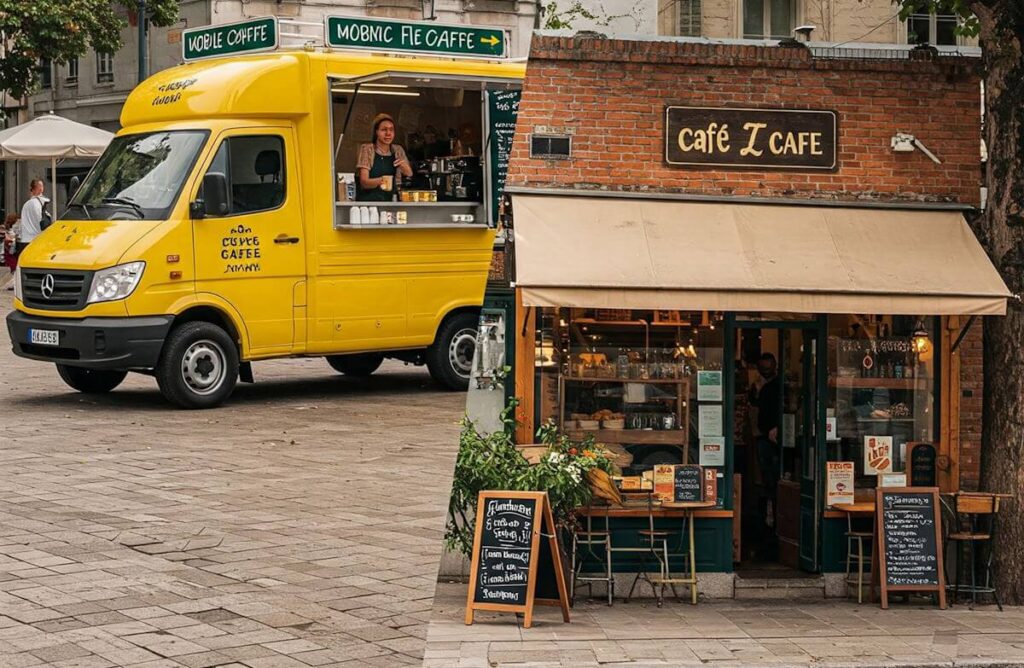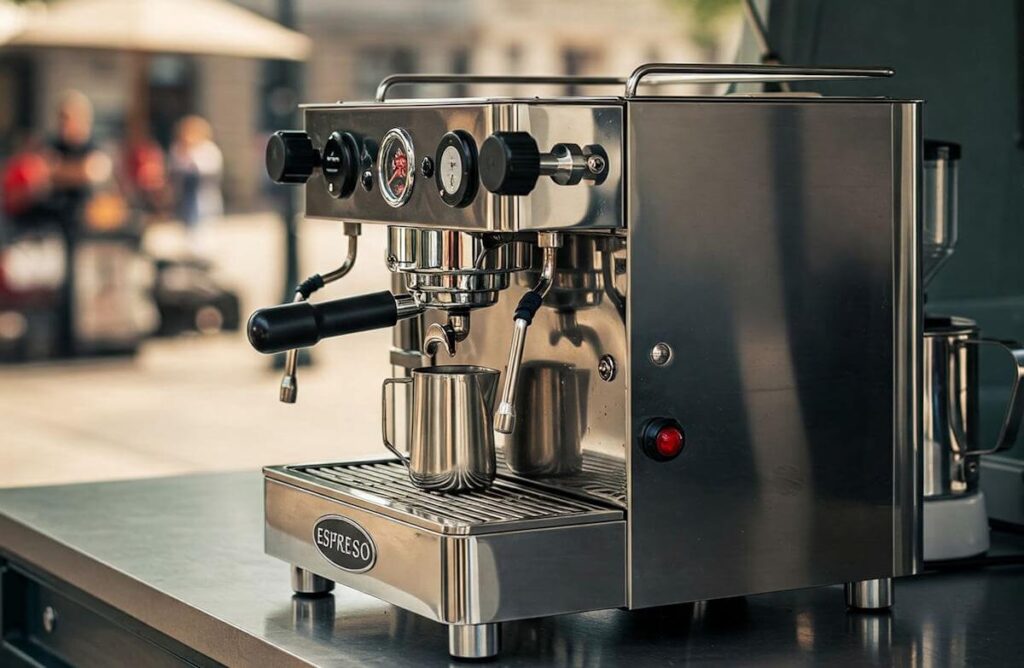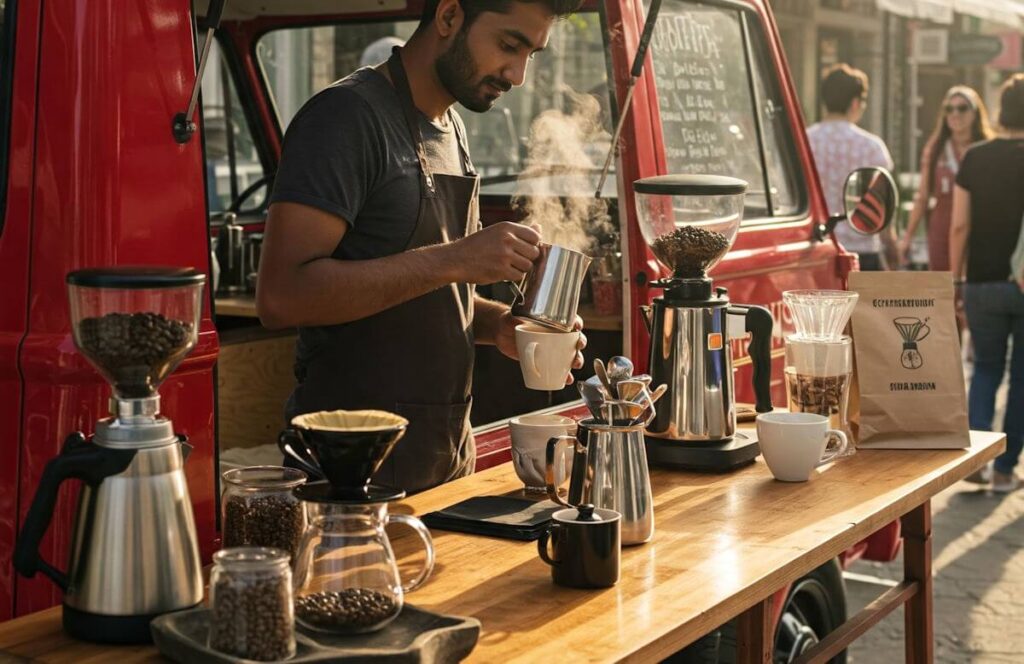Introduction to Mobile Coffee Setups
Mobile coffee setups have emerged as a popular trend in the beverage industry, catering to the growing demand for quality coffee in diverse environments such as festivals, outdoor cafés, and various events. These setups typically involve compact equipment that can be transported easily, allowing baristas to serve high-quality coffee on location rather than relying on a fixed café. This flexibility not only meets customers’ evolving preferences for artisanal beverages but also enhances the overall experience of attending events by providing convenient access to specialty coffee.
The rise in popularity of mobile coffee setups can be attributed to several factors, including the increasing appreciation for gourmet coffee and the desire for unique consumer experiences. As people seek out artisanal and gourmet options, mobile coffee vendors have the opportunity to capitalize on this trend by attending events and locations where traditional cafés may not be available. Additionally, advancements in brewing technology and equipment have made it feasible for smaller setups to deliver café-level quality coffee even in remote locations.
To maintain consistency in coffee quality, having a reliable water system is of paramount importance in mobile coffee setups. Clean and well-managed water sources are essential not only for brewing coffee but also for sanitation and operational efficiency. Different water systems can be implemented, including on-demand systems connected to a local water supply or tank-based solutions that can be filled before transport. Regardless of the setup, ensuring a stable and adequate supply of water directly impacts the quality of coffee produced and the efficiency of service offered to customers.
The Importance of Water Quality in Coffee
Water quality plays a pivotal role in the brewing of coffee, serving as the base for this beloved beverage. Approximately 98% of a cup of coffee consists of water, which means that its chemical composition can significantly influence the taste, aroma, and overall experience. Various minerals, contaminants, and impurities found in water can either enhance or detract from the flavor profile of coffee. As such, understanding the importance of water quality is essential for anyone involved with coffee brewing, particularly for mobile coffee setups that demand consistency and excellence in every cup.
The interaction between water and coffee grounds unlocks the full potential of the beverage. Minerals such as magnesium and calcium can enhance flavor extraction, contributing to a robust cup with well-balanced acidity. Conversely, excessive levels of certain minerals, such as chlorine or sodium, can impart undesirable tastes, resulting in a flat or bitter coffee. It is vital for mobile coffee setups to evaluate the water they utilize, ensuring it is free from harsh chemicals and pollutants that might interfere with the brewing process.
Moreover, the temperature and pH of water also play crucial roles in coffee extraction. Water that is too hot may extract unwanted compounds, while water that is too cold may fail to extract the essential flavors and aromas. Thus, sourcing water that is not only clean but also at the right temperature and with an optimal pH level is imperative for achieving the desired taste. Mobile coffee setups should invest in water filtration systems or consider using bottled water that meets quality standards, as this ensures that the end product is consistently enjoyable and fulfilling for their customers.
Types of Water Sources for Mobile Coffee Setups
For mobile coffee setups, selecting an appropriate water source is crucial as it directly influences the flavor and quality of the beverages offered. Three primary options commonly utilized are tap water, bottled water, and filtration systems. Each source presents unique advantages and disadvantages, potentially impacting the operation and customer satisfaction.
Tap water is often the most accessible option for many mobile coffee vendors. Since most locations have water main access, this source can be readily available and cost-effective. However, the quality of tap water can vary significantly based on the local infrastructure. In some regions, contaminants or high mineral content might affect the taste of the brewed coffee. Therefore, it is essential for vendors to routinely test tap water quality and, if necessary, implement additional measures to enhance its suitability for brewing.
Bottled water represents another alternative. It is generally perceived as a reliable source due to consistent quality standards adhered to by manufacturers. Bottled water provides vendors with an easy solution by eliminating concerns related to tap water quality and ensuring a clean, neutral flavor profile. Nevertheless, the use of bottled water can lead to increased operating costs, contributing to higher prices for customers. Additionally, the environmental implications of single-use plastic bottles should also be taken into account.
Filtration systems present a third viable option for mobile coffee setups. Employing various technologies such as activated carbon, reverse osmosis, or UV filtration, these systems effectively remove impurities while retaining essential minerals. This option allows for customization, whereby vendors can adjust the water quality to suit specific brewing preferences. However, initial costs and maintenance associated with filtration units may deter some operators, requiring careful consideration of the total cost of ownership.
Water Filtration Systems: An Overview
Water filtration systems play a crucial role in ensuring the quality of water used in mobile coffee setups. With different types available, it is essential to understand how each functions and their benefits for mobile operations. This section will explore three primary types of filtration systems: reverse osmosis, carbon filters, and UV purification.
Reverse osmosis (RO) is a highly effective filtration system that utilizes a semipermeable membrane to remove impurities from water. By applying pressure, water is forced through the membrane, leaving contaminants such as salts, bacteria, and heavy metals behind. For mobile coffee setups, an RO system can ensure a consistent source of clean water, which is vital for brewing high-quality coffee. However, the system may require additional components, such as a storage tank and a pressure pump, making it a complex option for some mobile operations.
Carbon filters, on the other hand, offer a simpler approach by using activated carbon to absorb impurities and enhance the taste of water. These filters can remove chlorine, sediment, and volatile organic compounds, improving the overall flavor profile of the coffee. Portable carbon filter systems are available in various forms, including pitcher filters and inline systems, making them highly adaptable for mobile coffee setups. While carbon filters may not eliminate all contaminants, they significantly enhance water quality and provide a desirable taste.
Another notable option is UV purification, which employs ultraviolet light to sterilize water by destroying harmful microorganisms. This method is particularly effective in eliminating bacteria and viruses without the use of chemicals. UV purification systems are compact and energy-efficient, making them suitable for mobile coffee setups. However, they do not remove chemical contaminants or sediments, so they are often used in combination with other filtration systems for optimal results.
In conclusion, understanding the various water filtration systems available for mobile coffee setups is crucial for operators aiming to provide high-quality beverages. Each system—whether it is reverse osmosis, carbon filtration, or UV purification—has its unique advantages and considerations, making the selection process essential for achieving the best results in a mobile environment.
Storage Solutions for Mobile Water Supplies
Effective storage solutions for water supplies are integral to any mobile coffee setup. Adequate management of water storage not only ensures the availability of fresh water but also plays a critical role in maintaining hygiene and preventing contamination. The choice of materials, tank sizes, and portability should be carefully considered to create an efficient water management system.
When selecting materials for water storage, food-grade plastic tanks or stainless steel containers are recommended. Food-grade plastic prevents leaching harmful chemicals into the water, ensuring it remains safe for consumption. Stainless steel containers are also a suitable option as they are non-corrosive and easy to clean, thus reducing the risk of bacterial growth that can lead to contamination. It is essential to verify that whatever material is chosen resists degradation over time, particularly when exposed to varying temperatures.
Tank size is another important factor in water storage for mobile coffee setups. Smaller setups may only require a few gallons, while larger operations might necessitate a more significant capacity. As a general guideline, it is advisable to keep a reserve of at least five to ten gallons, as this ensures that water is available throughout the duration of service without frequent refills. However, the tank should be manageable in terms of weight and space, facilitating smooth transportation.
Portability features such as built-in handles, wheels, or collapsible designs can enhance the mobility of water tanks. Additionally, to prevent contamination during storage, it is crucial to ensure that all tanks are sealed properly when not in use. Regular cleaning and sanitization of the water storage system must also be prioritized to maintain water quality and to provide customers with fresh, safe beverages.
Dispensing Systems: Options and Best Practices
In the realm of mobile coffee setups, selecting the appropriate water dispensing system is essential for ensuring efficiency and maximizing the quality of service. There are various options available, each with its own benefits and potential drawbacks. The primary types of water dispensing systems include manual pumps, electric dispensers, and gravity-fed systems.
Manual pumps are popular in mobile coffee setups due to their simplicity and ease of use. They do not require electricity, making them an optimal choice for locations where power sources are scarce. These systems typically involve a hand-operated mechanism, allowing baristas to control the flow of water effectively. However, they may not be suited for high-demand environments, as the manual operation can slow down the overall service rate.
On the other hand, electric dispensers provide a more efficient option for establishments that anticipate a larger volume of customers. These devices can quickly dispense a consistent amount of water with minimal effort, thereby improving the speed of service. Electric systems often come equipped with features such as temperature control and automatic shut-off, contributing to user convenience and energy conservation. Nevertheless, they require a reliable power source, which may limit their deployment in certain settings.
Gravity-fed systems present another viable option for mobile coffee setups. These systems rely on the natural force of gravity to deliver water, making them an eco-friendly and energy-efficient solution. They are typically easy to install and operate without complicated mechanisms. However, attention must be given to water contamination risks, which can occur if the source is not adequately protected.
To ensure optimal performance and minimize waste across all dispensing systems, best practices should include regularly maintaining equipment, ensuring clean water sources, and training staff on effective usage techniques. Selecting the right water dispensing system tailored to the specific needs of a mobile coffee setup can significantly enhance operational efficiency and customer satisfaction.
Maintaining Your Water System: Tips and Tricks
Proper maintenance of your water system is essential for the effective operation of mobile coffee setups. Regular cleaning schedules are a fundamental part of this process. It is advisable to establish a robust cleaning routine that encompasses both daily and weekly tasks. Daily maintenance should include rinsing the water lines, flushing the system with clean water, and checking for any debris buildup. Weekly tasks can involve a more thorough cleaning of the water storage tanks, filtration systems, and all connected plumbing. Utilizing environmental-friendly cleaning agents can mitigate the risk of contamination while ensuring the longevity of the components.
Moreover, troubleshooting common issues promptly is crucial to avoiding larger problems down the line. A common concern may involve water pressure inconsistencies. If you notice weak water flow, inspect the filter systems for clogs and replace them if necessary. Additionally, regular monitoring of water quality is beneficial. Conduct periodic tests to ensure that your water remains safe and suitable for beverage preparation, especially when operating in varying water quality conditions.
Furthermore, compliance with local health and safety regulations is paramount for the operation of mobile coffee setups. Familiarize yourself with the relevant guidelines pertaining to water systems in your area. This may include regulations on water source quality, permissible materials for plumbing, and sanitation practices. Documenting your maintenance activities not only ensures adherence to these regulations but also builds trust with your customers, evidencing a commitment to health and safety.
By implementing these tips and tricks, you will not only maintain the efficiency of your water system but will also enhance the overall quality of your coffee establishment. Consistent maintenance practices will ultimately contribute to a successful mobile coffee business, ensuring a reliable supply of fresh, clean water for brewing delightful beverages.
Environmental Considerations for Water Use
As the coffee culture continues to evolve, the environmental impact of mobile coffee setups has come into sharper focus. Sustainability in water usage is becoming increasingly crucial, as consumers are more aware of their ecological footprint. It is essential for mobile coffee vendors to implement water-saving practices that minimize waste while delivering quality beverages. One effective strategy involves the careful monitoring of water consumption. By tracking usage patterns, operators can identify areas for reduction and optimize their water infrastructure accordingly.
Another eco-friendly approach is the reuse of water. For instance, water that has cooled after brewing can be repurposed for rinsing equipment or cleaning purposes, thereby conserving fresh water resources. This practice not only reduces overall water consumption but also helps in establishing a sustainable workflow within the mobile coffee operation. Additionally, vendors can offer alternative methods for their customers to engage in water conservation, such as providing options for customers to choose smaller portions of drinks which require less water to produce.
Incorporating water-efficient technologies, such as low-flow faucets and eco-friendly brewing machines, is another significant step towards sustainability. These innovations can significantly reduce water usage with little to no compromise on beverage quality. Furthermore, training staff on the importance of sustainable practices can foster a culture of responsibility and awareness. This not only enhances the environmental credentials of the mobile coffee setup but also resonates with the growing demographic of eco-conscious consumers.
Ultimately, aligning water use practices with modern sustainability expectations not only aids in environmental stewardship but also positions the mobile coffee business as a responsible player in the industry. Implementing these strategies will not only contribute to water conservation but will also enhance customer loyalty amongst those who appreciate eco-friendly initiatives.
Conclusion: Creating an Efficient Water System for Success
In the competitive landscape of mobile coffee businesses, having a well-structured water system is crucial for ensuring consistent quality and efficiency. Throughout this blog post, we have explored the various components that constitute an effective water system tailored to mobile coffee setups. From understanding the different types of water filtration methods to assessing the specific water needs of diverse coffee brewing techniques, these elements culminate in crafting a seamless workflow that can significantly enhance customer satisfaction.
A core takeaway is the importance of water quality. Utilizing filtered water not only improves the taste of coffee but also extends the lifespan of equipment. Mobile coffee setups often operate under variable conditions, making it essential to have reliable water management systems in place. Moreover, hydration plays a substantial role in the flavor profile of the beverages served. Hence, investing in high-quality filtration systems is a prudent strategy that can yield long-term benefits.
Moreover, understanding the logistics of water storage and distribution is paramount. Efficient water systems must include adequate storage solutions that are both portable and capable of maintaining optimal temperatures. Ensuring that your mobile coffee operation adheres to health standards and effectively manages water resources will prevent operational disruptions and promote a sustainable business model.
In conclusion, by dedicating time and resources to refine your water setup, you will not only enhance the flavor and quality of your offerings but also improve operational efficiency. As a mobile coffee entrepreneur, recognizing the significance of an effective water system is foundational to achieving ongoing success and establishing a loyal customer base. Investing in an optimized water system is, therefore, a critical component in elevating your mobile coffee experience.




